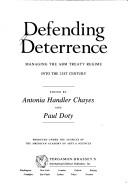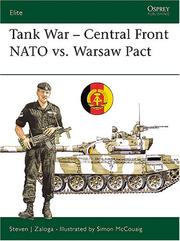| Listing 1 - 10 of 36 | << page >> |
Sort by
|

ISBN: 080183726X Year: 1989 Publisher: Baltimore London Johns Hopkins Press
Abstract | Keywords | Export | Availability | Bookmark
 Loading...
Loading...Choose an application
- Reference Manager
- EndNote
- RefWorks (Direct export to RefWorks)
Book
ISBN: 0710605854 Year: 1989 Publisher: Coulsdon, UK : Jane's Information Group,
Abstract | Keywords | Export | Availability | Bookmark
 Loading...
Loading...Choose an application
- Reference Manager
- EndNote
- RefWorks (Direct export to RefWorks)
Book
Abstract | Keywords | Export | Availability | Bookmark
 Loading...
Loading...Choose an application
- Reference Manager
- EndNote
- RefWorks (Direct export to RefWorks)
In March 1988, a conference was held in Ebenhausen, West Germany, on Reconstructing NATO Strategy for the 1990s, to discuss the future of Alliance strategy. In particular, conference sessions covered such topics as the evolution of Soviet strategy; options and concepts for rebuilding NATO strategy (including a discussion on "discriminate deterrence"); concepts, options, and priorities for nuclear and conventional force structure development, including modernization and arms control; and the future role of Western Europe within the Alliance. The key points that emerged from the conference include: (1) changes inside the Soviet Union should continue to present a challenge to NATO in reconstructing its defense strategy; (2) flexible response/extended deterrence is still the best doctrine available to NATO, and nuclear weapons are still crucial to the defense of the West; (3) remaining intermediate-range nuclear forces (INF) must be restructured following the INF treaty, in order to strengthen NATO INF capabilities and bolster this element of flexible response doctrine; (4) negotiations should cover the Atlantic-to-the-Urals region and lead to deep, asymmetrical cuts in offensive armor; and (5) arms control (both nuclear and conventional) must be integrated with NATO's broader strategic requirements.
Book
Year: 1989 Publisher: Santa Monica, CA : RAND Corporation,
Abstract | Keywords | Export | Availability | Bookmark
 Loading...
Loading...Choose an application
- Reference Manager
- EndNote
- RefWorks (Direct export to RefWorks)
The allocation of burdens and responsibilities within NATO has been a contentious issue since the formation of the alliance. This report explores the reasons that European defense spending is proportionately less than that of the United States, and contrasts the European spending record with their more impressive record in supplying defense resources to the Atlantic Alliance. The analysis makes clear that there are no simple quantitative criteria for assessing burden-sharing performance. Changing perceptions of the Soviet threat, and the forthcoming 1992 change in the European Economic Community, complicate the burden-sharing issue. Burden-sharing must be addressed together with needed changes in NATO military strategy and doctrine, and in light of the new political challenge for NATO governments posed by the Soviet Union's new style of security diplomacy. A clearer consensus within NATO on a future force structure and military doctrine is essential for acceptable future burden-sharing arrangements.
Book
ISBN: 9284500494 Year: 1989
Abstract | Keywords | Export | Availability | Bookmark
 Loading...
Loading...Choose an application
- Reference Manager
- EndNote
- RefWorks (Direct export to RefWorks)
North Atlantic Treaty Organization --- North Atlantic Treaty Organization. --- Otan --- Armees --- Guides, manuels, etc. --- Organisation
Book
Year: 1989 Publisher: Brookline, MA : Institute for Defense & Disarmement Studies,
Abstract | Keywords | Export | Availability | Bookmark
 Loading...
Loading...Choose an application
- Reference Manager
- EndNote
- RefWorks (Direct export to RefWorks)

ISBN: 0080367445 Year: 1989 Publisher: Washington : Pergamon-Brassey's,
Abstract | Keywords | Export | Availability | Bookmark
 Loading...
Loading...Choose an application
- Reference Manager
- EndNote
- RefWorks (Direct export to RefWorks)
NUCLEAR ARMS CONTROL AND DISARMAMENT --- ANTIMISSILE MISSILES --- ABM TREATY (1972)
Book
ISBN: 0080373399 9780080373393 Year: 1989 Volume: 1 Publisher: London: Brassey's,
Abstract | Keywords | Export | Availability | Bookmark
 Loading...
Loading...Choose an application
- Reference Manager
- EndNote
- RefWorks (Direct export to RefWorks)

ISBN: 0850459044 Year: 1989 Publisher: London : Osprey,
Abstract | Keywords | Export | Availability | Bookmark
 Loading...
Loading...Choose an application
- Reference Manager
- EndNote
- RefWorks (Direct export to RefWorks)
Book
ISBN: 0521333180 Year: 1989 Publisher: Cambridge Cambridge University Press
Abstract | Keywords | Export | Availability | Bookmark
 Loading...
Loading...Choose an application
- Reference Manager
- EndNote
- RefWorks (Direct export to RefWorks)
Law of treaties --- Treaties --- Treaty-making power --- History. --- Traités --- Droit --- Pouvoir de conclusion
| Listing 1 - 10 of 36 | << page >> |
Sort by
|

 Search
Search Feedback
Feedback About UniCat
About UniCat  Help
Help News
News